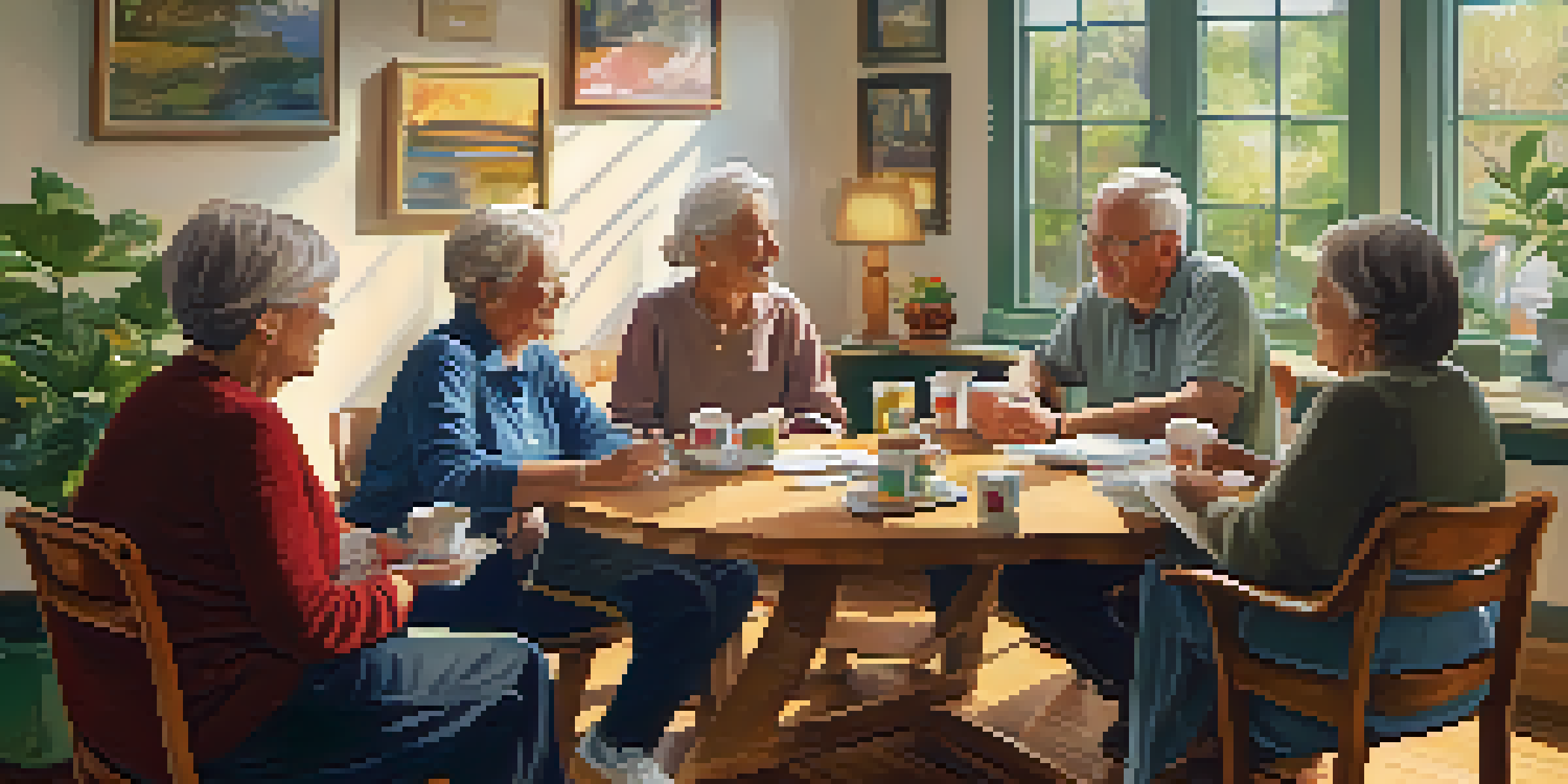The Role of Support Groups in Healthy Aging

Understanding Support Groups and Their Purpose
Support groups are gatherings of individuals who share common experiences or challenges, providing a safe space for discussion and connection. They can focus on various topics, including health issues, emotional well-being, or life transitions, making them versatile tools for support. The primary purpose is to foster a sense of community and understanding among participants, allowing them to share insights and coping strategies.
We are all just walking each other home.
For older adults, support groups can be particularly beneficial, as they often face unique challenges such as isolation, health concerns, and loss of loved ones. By connecting with others who understand their experiences, they can find validation and encouragement in their journey. This camaraderie is essential for promoting mental and emotional health, which plays a big role in healthy aging.
Moreover, support groups can empower individuals to take charge of their health by sharing valuable information and resources. Members may discuss local services, health tips, or even recreational activities, enhancing their quality of life. Ultimately, these groups serve as a crucial lifeline, helping individuals navigate the complexities of aging together.
The Emotional Benefits of Joining a Support Group
One of the standout benefits of support groups is the emotional support they provide, which can significantly alleviate feelings of loneliness and depression. Many older adults find themselves isolated due to mobility issues or the loss of peers, leading to a decline in mental health. Being part of a group that shares similar experiences can create a sense of belonging and reduce feelings of isolation.

Additionally, sharing personal stories can foster empathy and understanding among group members. Participants often feel more comfortable expressing their feelings in an environment where others can relate, leading to cathartic moments that promote healing. This shared vulnerability cultivates deeper connections and encourages individuals to be open about their struggles.
Support Groups Foster Community
Support groups provide older adults with a sense of belonging and understanding, promoting emotional health and combating isolation.
Furthermore, the emotional resilience built in support groups can lead to improved coping mechanisms. Learning from others’ experiences allows individuals to explore new ways to handle challenges, making them feel more equipped to face life's ups and downs. This emotional toolkit is essential for maintaining a positive outlook as one ages.
Support Groups and Social Interaction: A Key to Longevity
Social interaction is a critical component of healthy aging, and support groups are a fantastic way to nurture these connections. Regular engagement with peers helps combat feelings of loneliness and fosters a sense of community, both of which are vital for emotional well-being. Studies have shown that maintaining social ties can lead to a longer, healthier life.
The greatest discovery of my generation is that a human being can alter his life by altering his attitude.
Through group activities, discussions, and shared experiences, individuals can create lasting friendships that extend beyond the group setting. These connections often lead to social engagement in other areas of life, such as participating in community events or pursuing hobbies together. Such activities not only enrich their lives but also promote a sense of purpose.
Moreover, the camaraderie formed in support groups can encourage members to maintain healthier lifestyles. Group members might motivate one another to engage in physical activities, attend health screenings, or adopt better eating habits. This collective effort reinforces the idea that aging can be vibrant and fulfilling when surrounded by supportive friends.
Educational Aspects of Support Groups for Seniors
Support groups often serve as platforms for education, where members can learn about various aspects of aging and health. Guest speakers, workshops, or shared articles can provide valuable insights into managing health conditions, navigating caregiving roles, or understanding mental health issues. This knowledge empowers individuals to make informed decisions about their lives.
Additionally, the sharing of personal experiences can reveal practical tips and strategies that might not be covered in traditional educational settings. Whether it's discovering new medications or discussing local resources, the collective wisdom of the group can be a treasure trove of information. Such exchanges not only enhance individual knowledge but also foster a culture of learning within the group.
Emotional Benefits Enhance Well-Being
Participating in support groups helps individuals develop emotional resilience and coping strategies, crucial for maintaining a positive outlook as they age.
As members gain new insights, they often feel more confident in their ability to advocate for their own health and well-being. This increased confidence can lead to improved communication with healthcare providers and a greater understanding of personal health needs. Ultimately, education within support groups contributes to more proactive and informed approaches to aging.
Finding the Right Support Group for Your Needs
Choosing the right support group is crucial for reaping its benefits. Individuals should consider what they hope to gain from the experience—whether it's emotional support, education, or social interaction. Researching various options, such as community centers, hospitals, or online platforms, can help in identifying groups that align with personal goals and interests.
It’s also important to assess the group dynamics and atmosphere. A welcoming, inclusive environment fosters open communication and trust among members. Attending a few meetings as a guest can provide insights into the group's culture and whether it feels like a good fit.
Lastly, remember that it's okay to try different groups before settling on one. Each group has its unique flavor, and finding the right one can take time. The goal is to find a supportive community that enhances your aging experience, making it as fulfilling and enriching as possible.
Overcoming Barriers to Joining a Support Group
While the benefits of support groups are clear, many older adults may hesitate to join due to various barriers. These can include mobility issues, lack of transportation, or feelings of shyness and vulnerability. Acknowledging these challenges is the first step toward addressing them and finding solutions that work.
For those with mobility concerns, many support groups now offer virtual meetings, allowing individuals to participate from the comfort of their homes. This accessibility can help eliminate the fear of transportation and make it easier for seniors to connect with others. Technology may seem daunting, but many groups provide assistance in getting started.
Education Empowers Healthy Aging
Support groups serve as valuable educational platforms, equipping members with knowledge and resources to better advocate for their health and well-being.
Additionally, fostering an inclusive atmosphere where new members are welcomed can help ease feelings of shyness. Existing members can play a role in making newcomers feel comfortable, perhaps by sharing their own experiences or reaching out personally. By breaking down these barriers, more individuals can enjoy the enriching experience that support groups offer.
The Long-Term Impact of Support Groups on Aging
The influence of support groups extends beyond immediate benefits, as they can foster long-term positive changes in individuals’ lives. Those who regularly engage in support groups often report enhanced mental well-being, improved self-esteem, and better coping skills. These changes contribute to a more proactive approach to aging, where individuals feel empowered to prioritize their health and happiness.
Additionally, the relationships built within support groups can provide ongoing support, even outside of meetings. These connections can serve as a network of accountability, where members encourage one another to stay active and engaged in life. This sense of camaraderie is invaluable in maintaining motivation and resilience as one faces the challenges of aging.

Ultimately, the long-term impact of support groups is a richer, more fulfilling experience of aging. By cultivating community, enhancing knowledge, and promoting emotional well-being, these groups play a vital role in helping individuals navigate the complexities of growing older with grace and dignity.